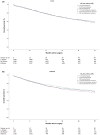Impact of hospital volume on survival in patients with locally advanced colon cancer - A Dutch population-based study
- PMID: 39865913
- PMCID: PMC11873530
- DOI: 10.1111/codi.17288
Impact of hospital volume on survival in patients with locally advanced colon cancer - A Dutch population-based study
Abstract
Aim: Locally advanced colon cancer (LACC) often necessitates complex prognosis-determining treatment. This study investigated the impact of hospital volume on short- and long-term outcomes following surgery for LACC.
Method: Data involving all patients with LACC categorized as clinical T4 and/or N2, between 2015 and 2019 in the Netherlands, were extracted from the Netherlands Cancer Registry. Hospitals were stratified into low volume (1-19 LACC resections per year), medium volume (20-29 LACC resections per year) and high volume (≥30 LACC resections per year). Data were analysed using Kaplan-Meier curves, logistic regression analysis and Cox-regression models.
Results: A total of 49 298 patients were diagnosed with colon cancer, of whom 9206 (18.7%) had locally advanced disease. Of these 9206 patients, resection was performed in 8537 with a median age of 71 (interquartile range: 63-78) years. Patients were more likely to undergo laparoscopic procedures in high-volume hospitals than in low-volume hospitals (OR = 1.28, 95% CI: 1.12-1.46). No risk differences in anastomotic leakage or postoperative 90-day mortality were observed according to hospital volume. Five-year overall survival rates were comparable among high-, medium- and low-volume hospitals (58.7% vs. 58.0% vs. 60.0%, p = 0.62). Hospital volume was not associated with overall survival in multivariable analysis. Independent predictors of worse overall survival included older age, higher American Society of Anaesthesiologists score, emergency/urgent setting, anastomotic leakage, higher pTNM status, involved resection margins and no adjuvant chemotherapy.
Conclusion: Despite the complexity of surgical treatment, hospital volume was not associated with survival in LACC. Hospital volume might be an imperfect surrogate for quality assessment.
Keywords: adjuvant therapy; hospital volume; locally advanced colon cancer; neoadjuvant therapy; surgical procedures; survival.
© 2025 The Author(s). Colorectal Disease published by John Wiley & Sons Ltd on behalf of Association of Coloproctology of Great Britain and Ireland.
Conflict of interest statement
P. J. Tanis received research grants from Allergan (LifeCell) and the Dutch Cancer Society unrelated to the submitted work. R. H. Verhoeven received research grants from Roche and Bristol‐Myers Squibb unrelated to the submitted work. J. H. W. de Wilt reports research grants from ZonMW, the Dutch Cancer Society, Medtronic and Roche unrelated to the submitted work. The other authors have no conflicts of interest or financial ties to disclose.
Figures


Similar articles
-
No difference between lowest and highest volume hospitals in outcome after colorectal cancer surgery in the southern Netherlands.Eur J Surg Oncol. 2013 Nov;39(11):1199-206. doi: 10.1016/j.ejso.2013.08.020. Epub 2013 Sep 3. Eur J Surg Oncol. 2013. PMID: 24044806
-
No Difference in Overall Survival Between Hospital Volumes for Patients With Colorectal Cancer in The Netherlands.Dis Colon Rectum. 2016 Oct;59(10):943-52. doi: 10.1097/DCR.0000000000000660. Dis Colon Rectum. 2016. PMID: 27602925
-
Defining a minimum hospital volume threshold for minimally invasive colon cancer resections.Surgery. 2022 Feb;171(2):293-298. doi: 10.1016/j.surg.2021.06.031. Epub 2021 Aug 22. Surgery. 2022. PMID: 34429201
-
Inter-hospital variation in resection rates of colon cancer in the Netherlands: A nationwide study.Eur J Surg Oncol. 2019 Oct;45(10):1882-1886. doi: 10.1016/j.ejso.2019.06.012. Epub 2019 Jun 8. Eur J Surg Oncol. 2019. PMID: 31202571
-
[Treatment reality with respect to laparoscopic surgery of colonic cancer in Germany].Chirurg. 2014 Jul;85(7):583-92. doi: 10.1007/s00104-014-2744-8. Chirurg. 2014. PMID: 24924639 Review. German.
References
-
- Cardoso R, Guo F, Heisser T, Hackl M, Ihle P, De Schutter H, et al. Colorectal cancer incidence, mortality, and stage distribution in European countries in the colorectal cancer screening era: an international population‐based study. Lancet Oncol. 2021;22(7):1002–1013. - PubMed
-
- Gillani M, Rosen SA. Current controversies in the Management of Locally Advanced Colon Cancer. Am Surg. 2023;89:31348231175490. - PubMed
-
- National Institute for Health and Care Excellence: Guidelines . Colorectal cancer. London: National Institute for Health and Care Excellence (NICE). Copyright © NICE 2021; 2021.
MeSH terms
LinkOut - more resources
Full Text Sources

